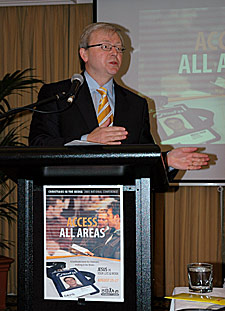Opposition spokesman for Foreign Affairs, Kevin Rudd, has told a media conference that Jesus cannot be confined to his private life " he must be allowed to influence the formation of public policy.
Addressing the Access All Areas conference organised by industry group Christians in the Media, Mr Rudd said recent attempts to limit believers to a narrowly defined set of moral issues and family values failed to comprehend the heart of his faith.
 "People have been wrestling over the role of Christianity in politics for the better part of two millennia and the dilemma is no better defined than when it began," Mr Rudd says.
"People have been wrestling over the role of Christianity in politics for the better part of two millennia and the dilemma is no better defined than when it began," Mr Rudd says.
"When it comes to questions of policy, there rarely is an absolute, authoritative, universal Christian response. But there are a set of values informed by Christianity that should shape your response to the debate."
Church leaders have faced scathing criticism for challenging the planned introduction of industrial relations reform by the Howard government.
Treasurer Peter Costello has openly questioned the credentials of theologians for commenting on what he indicates are economic issues.
But Mr Rudd says Christians who are involved in a secular democracy have a responsibility to inject their views into this sort of policy debate.
"We do not see human beings as simply another commodity that can be traded on a market," he says.
"They have a dignity as the work of the Creator. Human beings require protection."
The Opposition Foreign Affairs spokesman says it is increasingly difficult to present a Christian world view to the media because of the way the secular mindset seeks to pigeon-hole believers.
"In politics we feel uncomfortable about talking about these things because of the enormous capacity to be misunderstood," Mr Rudd says.
Journalists also heard from the Archbishop of Sydney, Dr Peter Jensen, who suggests the media are often guilty of editing out the "Jesus-speak' because it didn't sit comfortably with a secular viewpoint.
"I might talk about the current industrial relations legislation that is coming, but I am doing so because I believe in a God of relationships, who puts relationships higher than mere money-making," Dr Jensen says.
"If I am simply reported as speaking about weekends, then what I am saying is not distorted but destroyed."
Dr Jensen says a media focus that limits itself to what the church does or fails to do rarely engages with God's real message to humanity.
"God is a great communicator, but we are not great receivers," Dr Jensen says.
"God wants to speak to us in order to establish a fitting relationship with us. It’s no mistake that Jesus is referred to in the Bible as the ‘Word’ of God."
He says journalists need to ask why they think a God who has gone to such extreme lengths to reveal himself to humanity is of no interest to the public.
"There are hundreds of thousands of Australians who can’t find the most central fact of their life dealt with in the media. I wonder in economic terms if the media can afford to be a ‘foreign country’ to so many people," Dr Jensen says.
“God tells us, ‘by your words you will be judged’. God does not forget them. We are accountable for what we do with words.”
ABC chairman Donald McDonald, who officially opened the conference, agrees with the suggestion that there is a rising tide of secularism.
He reflected on a visit to the headquarters of the BBC which contains an engraved prayer that the building would be inhabited by "people who incline their ears to whatever is good might tread the path of virtue and honesty.'
"The sad fact of the matter is that if that building were built today it would not contain a plaque like that," Mr McDonald says.
"In 1931 it was considered perfectly natural to make a statement like that in public; today it would be too embarrassing that a statement of "private' belief would be considered appropriate for a corporation."
"There is a temptation to compartmentalise the Christian message into those topics that suit us and those that don’t," Mr Rudd adds.
"The tradition of Christianity in politics that I come from doesn’t see a personalised health and wealth gospel as the beginning and the end."
Quoting Rabbi Jonathan Sacks, Mr McDonald pointed to the need for television stations, as well as other media, to begin to give space to the moral voices, and begin to discuss what justice might mean in tomorrow's world.
"His call is not one for a good news network," Mr McDonald says.
"His call comes from a profound love of his fellow man and a love of God that tells us how to behave towards each other."
Photo: Miriam Fishwick























